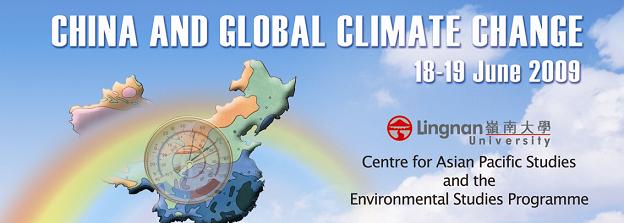
Event Title
Conference on China and Global Climate Change : Reconciling International Fairness and Protection of the Atmospheric Commons
Location
AM308, Lingnan University
Start Date
18-6-2009 11:00 AM
End Date
18-6-2009 12:30 PM
Language
English
Description
Instead of the notion that “developing countries will be able to use emission backed currency units to pay off their debts”, we find “developing countries must forgive developed countries their $ debts so that the ecbu-based climate regime can be introduced.” Looking at foreign debt as it stands, India may not yet have an interest in an emission backed currency unit (ecbu), and other developing countries might or might not either, or too, not until the dollar mess is sorted out. More important before the introduction of the emission backed currency unit is the demise of the dollar economies and their demise cannot be hastened by the introduction of the ecbu because the quantum of ecbu bears no relation at all to the quantum of foreign exchange circulating in the developed country economies today. The data suggests that the old international economy based on dollars is finished. There is no way these countries can ever pay back their debt, nor should they, because they would need fossil fuels to do so. Therefore all debts in all currencies in all countries must be forgiven. This is the same as saying the economies have to collapse. Once these economies have agreed to collapse, a new climate bank is established. Every person gets three point eight emission backed currency units and three point eight permits in the first year, declining to one permit per person in 2050. In this period the world trades, gently, prudently, as India has been doing, just to get what we need from the international market, which is basically renewable energy systems.
Document Type
Discussion
Recommended Citation
Sharan, A. (2009) Social economic and political aspects of climate change. In China and global climate change: Proceedings of the conference held at Lingnan University, Hong Kong, 18-19 June 2009 (pp. 157-172). Centre for Asian Pacific Studies and the Environmental Studies Programme, Lingnan University, Hong Kong.
Included in
Social economic and political aspects of climate change
AM308, Lingnan University
Instead of the notion that “developing countries will be able to use emission backed currency units to pay off their debts”, we find “developing countries must forgive developed countries their $ debts so that the ecbu-based climate regime can be introduced.” Looking at foreign debt as it stands, India may not yet have an interest in an emission backed currency unit (ecbu), and other developing countries might or might not either, or too, not until the dollar mess is sorted out. More important before the introduction of the emission backed currency unit is the demise of the dollar economies and their demise cannot be hastened by the introduction of the ecbu because the quantum of ecbu bears no relation at all to the quantum of foreign exchange circulating in the developed country economies today. The data suggests that the old international economy based on dollars is finished. There is no way these countries can ever pay back their debt, nor should they, because they would need fossil fuels to do so. Therefore all debts in all currencies in all countries must be forgiven. This is the same as saying the economies have to collapse. Once these economies have agreed to collapse, a new climate bank is established. Every person gets three point eight emission backed currency units and three point eight permits in the first year, declining to one permit per person in 2050. In this period the world trades, gently, prudently, as India has been doing, just to get what we need from the international market, which is basically renewable energy systems.

